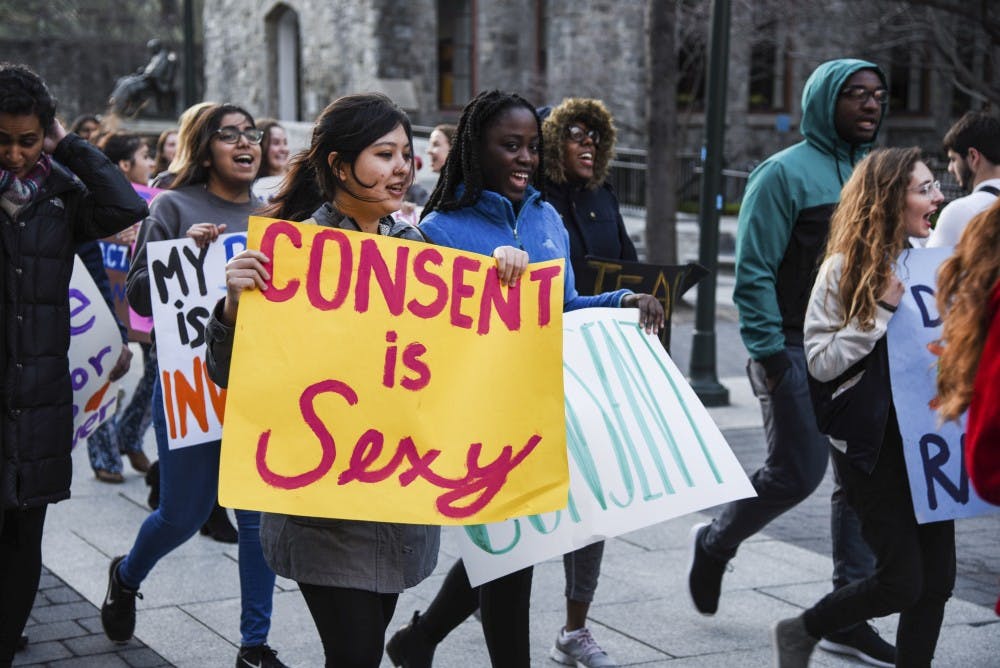
The results from the 2019 Association of American Universities survey on sexual harassment were recently released. The report showed that there was no statistically significant change in the rates of sexual harassment and assault from those reported four years ago, and that more than 25% of Penn undergraduate women experienced unwanted sexual contact. President Gutmann deemed these findings as “deeply troubling,” and said these statistics should galvanize the Penn community to action.
It falls to the student body to take action to improve a campus climate, which, since 2015, has been increasingly described by female undergraduates as having an “extremely problematic” sexual misconduct problem. While it falls on all Penn students to help prevent incidences of sexual harassment and assault, the men on this campus have a special responsibility to do so. In order to reduce the rates of sexual misconduct on this campus, the men on Penn’s campus need to hold themselves and each other to a higher standard and actively stop or prevent misconduct when they see it.
Men and women are both capable of preventing harassment and assault. But according to the AAU survey, men are more likely to do nothing after witnessing an assault than a woman in the same situation. After witnessing a variety of forms of sexual misconduct, undergraduate men chose to do nothing 43.6% of the time, as compared to 33.3% of undergraduate women. These statistics are troubling not just because the do-nothing rate for both sexes is intolerably high, but because the statistic for men is so much lower than it is for women even though men often operate from a position of greater power on this campus.
Much of Penn’s social scene takes place in male-dominated spaces. Moreover, men are afforded the luxury of male privilege, and so from a social perspective, it is easier for a man to insert himself into a situation of misconduct than it is for a woman.
This is coupled with the fact that men are far more likely to be perpetrators rather than victims. For all cases of forced penetration or sexual touching involving a female victim on this campus, 98.7% of the time the perpetrator was a man. For all cases of forced penetration or sexual touching involving a male victim, another male was the perpetrator 43.1% of the time. Although these statistics paint a picture that is not surprising, they underscore the point that sexual assault is largely a male-perpetuated issue and that if the men on this campus made a cultural commitment to preventing assault, genuine progress could be made.
Although approximately 90% of undergraduate men have attended at least one training session on how to prevent sexual assault or sexual misconduct, it will take more than a single training session to make genuine progress — it will take a wholesale shift in this campus’s culture in the way that men interact with women and each other. Men need to hold each other accountable for comments that might seem harmless in the moment but create a culture of toxic masculinity and female (and male) objectification. At parties, this means keeping tabs on female friends and intervening when male friends get a little pushy. It means checking in, even with strangers, and making sure that they’re safe, comfortable, and aware of their surroundings. It means not sitting on the sidelines and letting what is a questionable situation turn into a full-blown situation of rape or assault.
It’s also important to acknowledge the significant number of men who are themselves victims of sexual assault, and to recognize that women are capable of predatory behavior, too. Recognizing that men are not stoic, unfeeling statues but people that feel things just as intensely as everyone else is crucial in dismantling the cultural structures that predispose men to assault and allow men who have suffered from assault to get the help and support that they need.
Penn’s administration can do better by mandating more sexual assault education programs or finding ways to increase victims' access to resources. However, generating real change in Penn’s campus culture ultimately lies at the feet of the student body, and particularly at the feet of male students. Men at Penn need to leverage their social privilege so that people of all genders can feel secure on campus and can experience Penn’s social scene without falling victim to assault or harassment. Until that happens, we can only expect that little will change between this survey and the next.
College junior James Morrison was reelected as the Editor-in-Chief of Penn's satirical publication, Under the Button.
JAMES MORRISON is a College sophomore from Pipersville, Pa. studying English. His email address is jmorr2@sas.upenn.edu.
The Daily Pennsylvanian is an independent, student-run newspaper. Please consider making a donation to support the coverage that shapes the University. Your generosity ensures a future of strong journalism at Penn.
Donate



